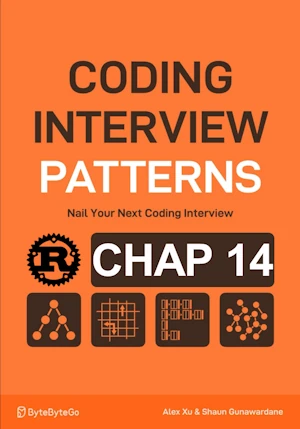Find All Permutations

- Return all permutations of a given array of unique i32.
- They can be returned in any order
The point:
- All
- Backtracking
Complexity :
| Time | Space |
|---|---|
| O(n x n!) | O(n) |
- O(n x n!) in time because from root explore n options. Then for each option we explore n-1 then n-2… options => n!. We then make a copy in O(n) => O(n x n!)
- O(n) in space because the max depth of the recursion tree. We keep track of used data structures and candidates in O(n). The result array is not taken into account.
V1
- First implementation
About Rust :
use std::collections::HashSet;let my_set = HashSet::new();my_set.contains(&my_value)my_set.insert(my_value)my_set.remove(&my_value)
- YES : tested on the Rust Playground
use std::collections::HashSet;
fn backtrack(nums: &[i32], candidate: &mut Vec<i32>, used: &mut HashSet<i32>, res: &mut Vec<Vec<i32>>) {
// if current candidate is a complete permutation add it to the result
if candidate.len() == nums.len() {
res.push(candidate.clone()); // cannot push candidate (it is used afterward) so we push a clone of it
return;
}
for &num in nums {
if !used.contains(&num) {
// Add num to the permutation and mark it as used
candidate.push(num);
used.insert(num);
// Recursively explore all branches using updated permutation candidate
backtrack(nums, candidate, used, res);
// Backtrack by reversing the changes made
candidate.pop();
used.remove(&num);
}
}
}
fn find_all_permutations(nums: &[i32]) -> Vec<Vec<i32>> {
let mut res = Vec::new();
backtrack(nums, &mut vec![], &mut HashSet::new(), &mut res);
res
}
// no main() if this code runs in a Jupyter cell
fn main() {
let nums = vec![4, 5, 6];
let permutations = find_all_permutations(&nums);
for permutation in permutations {
print!("{:?} - ", permutation); // [4, 5, 6] - [4, 6, 5] - [5, 4, 6] - [5, 6, 4] - [6, 4, 5] - [6, 5, 4] -
}
} // end of local scope OR end of main()
V2
- No hashset
- Work in place
- Swap in 0(1)
- Still cloning but nums, not candidate
fn backtrack(nums: &mut Vec<i32>, start: usize, res: &mut Vec<Vec<i32>>) {
// if current candidate is a complete permutation add it to the result
if start == nums.len() {
res.push(nums.clone()); // unavoidable here unless we return Vec<&[i32]>
return;
}
for i in start..nums.len() {
nums.swap(start, i);
backtrack(nums, start + 1, res);
nums.swap(start, i); // backtrack
}
}
fn find_all_permutations(nums: &[i32]) -> Vec<Vec<i32>> {
let mut res = Vec::new();
let mut nums = nums.to_vec();
backtrack(&mut nums, 0, &mut res);
res
}
// no main() if this code runs in a Jupyter cell
fn main() {
let nums = vec![4, 5, 6];
let permutations = find_all_permutations(&nums);
for permutation in permutations {
print!("{:?} - ", permutation); // [4, 5, 6] - [4, 6, 5] - [5, 4, 6] - [5, 6, 4] - [6, 4, 5] - [6, 5, 4] -
}
} // end of local scope OR end of main()